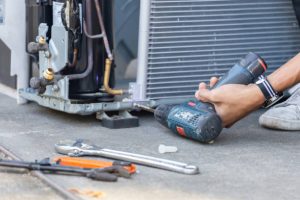Working in the HVAC industry in Denham, Springs requires a diverse set of tools to tackle various tasks.
HVAC tools and how they help technicians
1. Diagnostic Tools
These tools identify issues in HVAC systems and ensure everything is working properly.
- Multimeter: Measures voltage, current, and resistance in electrical components to identify faults or circuit issues.
- Manifold Gauge Set: Checks refrigerant levels and pressure for accurate system diagnostics.
- Thermometer and Hygrometer: Measures temperature and humidity to ensure systems are providing proper climate control.
- Leak Detector: Locates refrigerant leaks to prevent system damage and ensure environmental compliance.
2. Installation and Repair Tools
These tools help with the physical installation or repair of HVAC equipment
- Vacuum Pump: Removes moisture and air from the system to prepare for refrigerant charging.
- Pipe Bender: Bends copper or aluminum pipes to fit tight spaces without kinking or breaking.
- Tubing Cutter: Cuts copper or PVC pipes cleanly, preparing them for flaring or swaging.
- Sheet Metal Shears: Cuts ductwork or other sheet metal components to size.
3. Maintenance Tools
Regular maintenance keeps HVAC systems running efficiently and reduces breakdowns.
- Fin Comb: Straightens bent condenser and evaporator fins, ensuring optimal airflow.
- Nitrogen Regulator: Provides controlled nitrogen flow for purging and pressure testing.
- Crimpers and Swaging Tool: Securely joins or expands copper tubing for leak-free connections.
4. Inspection Tools
Inspection tools help technicians view difficult-to-reach areas, ensuring comprehensive system checks.
- Inspection Mirror: Allows viewing of small, hard-to-see spaces in ductwork or behind units.
- Borescope: A camera on a flexible tube that inspects inside ductwork or other concealed areas.
5. Safety Gear
Personal protective equipment (PPE) keeps technicians safe from harm.
- Safety Goggles and Gloves: Protect eyes and hands from debris, chemicals, and electrical hazards.
- Respirator: Filters harmful particles or chemicals, especially useful when working with refrigerants.
Having a well-rounded set of these HVAC tools ensures our technicians here at Summers Comfort Heating and Air, are equipped to diagnose, install, repair, and maintain any system. What other tools have you found essential in your HVAC work? Share your experiences with the community!
Have you tried any of these tools? Let us know which ones are your favorites or if there are other tools you’d recommend!




